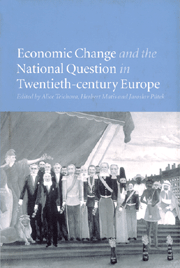Book contents
- Frontmatter
- Contents
- List of figures
- List of tables
- Notes on contributors
- Acknowledgements
- Introduction
- 1 Nationalism and the economic question in twentieth-century Ireland
- 2 Economic aspects of the nationality problem in nineteenth- and twentieth-century Belgium
- 3 The economy as a pushing or retarding force in the development of the German question during the second half of the twentieth century
- 4 Lusatian Sorbs in Germany before the Second World War: the influence of the economy on the national question
- 5 Unequal regional development in Switzerland: a question of nationality?
- 6 The Portuguese national question in the twentieth century: from Spanish threat to European bliss
- 7 From autarky to the European Union: nationalist economic policies in twentieth-century Spain
- 8 The economic background to the Basque question in Spain
- 9 Economic change and nationalism in Italy in the twentieth century
- 10 National integration and economic change in Greece during the twentieth century
- 11 National identity and economic conditions in twentieth-century Austria
- 12 Economic, social and political aspects of multinational interwar Czechoslovakia
- 13 Nationality and competition: Czechs and Germans in the economy of the First Czechoslovak Republic (1918–1938)
- 14 Economic aspects of Slovak national development in the twentieth century
- 15 Economic change and national minorities: Hungary in the twentieth century
- 16 Economic background to national conflicts in Yugoslavia
- 17 Economic differentiation and the national question in Poland in the twentieth century
- 18 Economy and ethnicity in the hands of the state: economic change and the national question in twentieth-century Estonia
- 19 Changing structure and organisation of foreign trade in Finland after Russian rule
- 20 Economic change and the national question in twentieth–century USSR/Russia: the enterprise level
- Index
11 - National identity and economic conditions in twentieth-century Austria
Published online by Cambridge University Press: 01 September 2009
- Frontmatter
- Contents
- List of figures
- List of tables
- Notes on contributors
- Acknowledgements
- Introduction
- 1 Nationalism and the economic question in twentieth-century Ireland
- 2 Economic aspects of the nationality problem in nineteenth- and twentieth-century Belgium
- 3 The economy as a pushing or retarding force in the development of the German question during the second half of the twentieth century
- 4 Lusatian Sorbs in Germany before the Second World War: the influence of the economy on the national question
- 5 Unequal regional development in Switzerland: a question of nationality?
- 6 The Portuguese national question in the twentieth century: from Spanish threat to European bliss
- 7 From autarky to the European Union: nationalist economic policies in twentieth-century Spain
- 8 The economic background to the Basque question in Spain
- 9 Economic change and nationalism in Italy in the twentieth century
- 10 National integration and economic change in Greece during the twentieth century
- 11 National identity and economic conditions in twentieth-century Austria
- 12 Economic, social and political aspects of multinational interwar Czechoslovakia
- 13 Nationality and competition: Czechs and Germans in the economy of the First Czechoslovak Republic (1918–1938)
- 14 Economic aspects of Slovak national development in the twentieth century
- 15 Economic change and national minorities: Hungary in the twentieth century
- 16 Economic background to national conflicts in Yugoslavia
- 17 Economic differentiation and the national question in Poland in the twentieth century
- 18 Economy and ethnicity in the hands of the state: economic change and the national question in twentieth-century Estonia
- 19 Changing structure and organisation of foreign trade in Finland after Russian rule
- 20 Economic change and the national question in twentieth–century USSR/Russia: the enterprise level
- Index
Summary
ECONOMIC DEVELOPMENT IN A MULTINATIONAL SETTING
Interest in questions of economic and political integration of regions with varying socio-economic levels and different ethnic and cultural backgrounds, understandable in the context of the establishment of the European Union, has drawn attention to the specific example of the former Habsburg Empire. From a retrospective view, the social reality has often been transformed into illusions. Historians asserted the existence of a wide, broadly cohesive common market, driven by market forces and based on comparative costs, a division of labour and a natural division of resources. But even before the outbreak of the First World War, one has to recognise a growing rivalry between different nationalities, nationally motivated boycotts and a growth of ‘national industries’. The dominant nations of the time, the Germans and the Magyars, and to some extent the Polish aristocracy in Galicia, altogether represented only 43 per cent of the entire population. Nevertheless, they dominated in both the political and economic spheres. While Transleithania's feudal agrarian structure was dominated by Magyar magnates, in Cisleithania1 the German middle class maintained strategic positions in cultural and social life, in politics and the economy. And it is an open question to what extent diverse reform projects, such as Austrian Prime Minister Ernest von Koerber's novel programme of economic development at the turn of the century, would have had a fair chance of overcoming national diversities and antagonisms – diversities and antagonisms that arose not only from socio-economic causes but also from irrationally motivated mass-psychological phenomena.
- Type
- Chapter
- Information
- Publisher: Cambridge University PressPrint publication year: 2000

